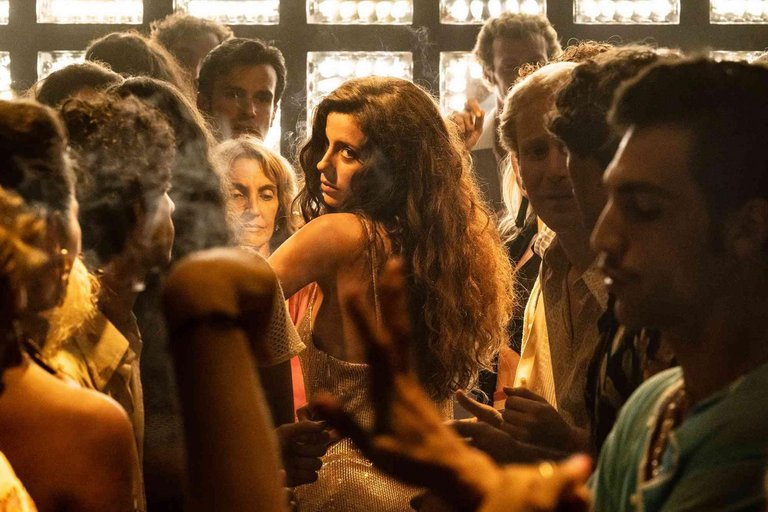
Paolo Sorrentino is one of the most celebrated and talented Italian directors of recent decades. His notoriety was cemented when he won the Oscar for Best Foreign Language Film (as the category was called back then) with what many consider his finest work: La grande bellezza. And although I've had it on my to-watch list for years, along with other titles by the same director (La giovinezza, É stata la mano di Dio, and Le conseguenze dell'amore), the truth is that until a couple of days ago I had never seen a film of his, something unusual for someone who enjoys the films of Fellini and Tornatore and the novels of Alessandro Baricco and Antonio Tabbuchi.
Paolo Sorrentino es uno de los directores italianos más célebres y talentosos de las últimas décadas. Su notoriedad se vio consolidada cuando se llevo el Oscar a Mejor Película de habla no inglesa (así se llamaba la categoría entonces) con lo que muchos consideran su mejor obra: La grande bellezza. Y aunque la tengo en mi lista de pendientes hace años, junto a otros títulos de este mismo director (La giovinezza, È stata la mano di Dio y Le conseguenze dell'amore), lo cierto es que hasta hace un par de días nunca había visto una película suya, algo inusual para alguien que disfruta el cine de Fellini y Tornatore y las novelas de Baricco y Tabbuchi.
So when the Italian Institute of Culture of Santiago de Chile invited me to the avant premiere of Sorrentino's latest film, which will hit theaters next week, I didn't hesitate to attend the screening, even though it ' not usual for me, since I usually like to see the works of directors in order of release date - as far as possible - to appreciate their evolution, references to their own work, style, etcetera. Parthenope, written, produced and directed by Sorrentino himself tells the story of a woman's life from her birth in the middle of the last century until today, showing the events that marked her destiny and a constant search for meaning in life in general and her existence in particular. Most of the film focuses on the girl's youthful years, named after the title of the film, say between 18 and 30 years old. From the very beginning, with that first appearance emerging from the sea, Parthenope floods the screen with the magnetism and strength of her beauty and youth, but la ragazza is more than just a pretty face. Curious, intelligent, with a natural drive to know and always wanting to have an answer ready for everything, every man who sees her pass by or talks to her is captivated by this Diva who, despite her young age, seems to hide a mysterious wisdom of the eternal as she enjoys life and the pleasures of youth. Moreover, Parthenope has that trapping mix of beauty and kindness that makes some leading ladies unforgettable on the big screen, and the film's cinematography - with its close ups of Parthenope's eyes and smile and open shots of her physiognomy - ensures that we never forget that.
Así que cuando el Instituto Italiano de Cultura de Santiago de Chile hizo la invitación a la avant premiere de la última película de Sorrentino, que llegará a las salas del país la próxima semana, no dude en acudir a la función, a pesar de no ser lo usual en mí, pues normalmente me gusta ver las obras de los directores en orden por fecha de estreno - en la medida de lo posible - para apreciar su evolución, las referencias a su propia obra, estilo, etcétera. Parthenope, escrita, producida y dirigida por el propio Sorrentino cuenta la vida una mujer desde su nacimiento en la mitad del siglo pasado hasta hoy, mostrando los eventos que marcaron su destino y una búsqueda constante de sentido a la vida en general y a su existencia en particular. La mayor parte de la película se centra en los años de juventud de la chica, llamada como el título de la cinta, digamos entre los 18 y los 30 años. Desde el inicio, con esa primera aparición saliendo del mar, Parthenope inunda la pantalla con el magnetismo y la fuerza propia de su belleza y su juventud, pero la ragazza es más que una cara bonita. Curiosa, inteligente, con el impulso natural de saber y de querer tener una respuesta lista siempre para todo, cada hombre que la ve pasar o habla con ella queda prendido de esta Diva que, pese a su corta edad, parece ocultar una misteriosa sabiduría de lo eterno mientras disfruta de la vida y de los placeres de la juventud. Además, Parthenope tiene esa atrapante mezcla de belleza y bondad que hace inolvidables a algunas protagonistas de la gran pantalla y la fotografía de la película - con sus close ups a los ojos y la sonrisa de Parthenope y las tomas abiertas de su fisonomía - se encarga de que nunca nos olvidemos de eso.
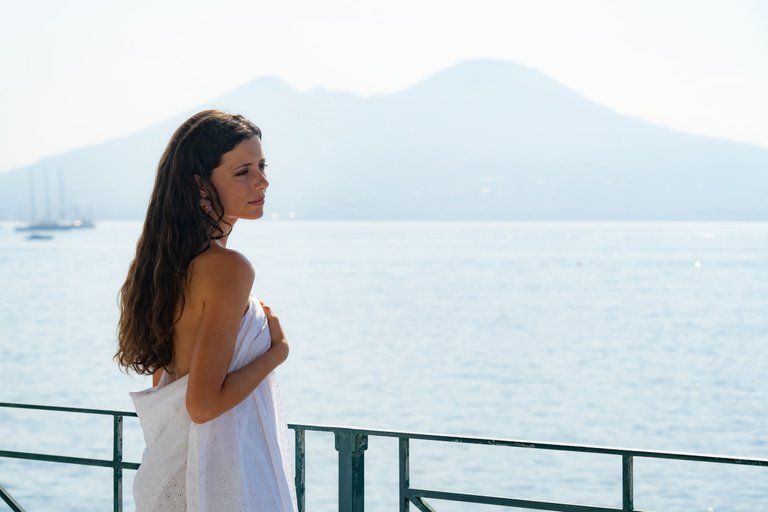
The Gulf of Naples, a perfect summer in Capri, an unspeakable passion for freedom, the discovery of love and its many faces, the closeness of the girl with her brother Raimondo and their mutual friend Sandri, intellectual stimulation, the cult of beauty, desire, power, loneliness, pain... all this and much more forms part of the plot of this 136-minute film, which never feels long or tedious thanks to the wit of a script full of contradictions, turning points, bizarre experiences, charming and despicable characters, and, above all, good humor. There were several moments when I laughed out loud at the dialogue between the characters and Sorrentino's wit.
El Golfo de Napolés, un verano perfecto en Capri, una pasión indecible por la libertad, el descubrimiento del amor y sus diferentes rostros, la cercanía de la chica son su hermano Raimondo y el amigo de ambos, Sandri, la estimulación intelectual, el culto a la belleza, el deseo, el poder, la soledad, el dolor... todo esto y mucho más forma parte de la trama de esta cinta de 136 minutos de duración que no se hacen largos ni tediosos gracias a las ocurrencias de un guion cargado de contradicciones, puntos de inflexión, experiencias rarísimas, personajes encantadores y despreciables y, sobre todo, buen humor. Fueron varios los momentos en que me reí a carcajadas con los diálogos entre los personajes y las ocurrencias de Sorrentino.
Much has been said that in this film the director pays homage to his native Naples and it's evident from the title. There's a Greek myth that tells how a mermaid who couldn't seduce Odysseus on his return home after the Trojan War threw herself into the sea and was carried by the waves to a city where she was buried and a temple was built. That temple later became a town and in that place where that Greek town was erected the city of Naples was later settled, a city that this year will celebrate 2,500 years of history, what was the name of that mermaid? Parthenope. That fact, at first glance, makes one think of the protagonist as the incarnation of a city, with its vices and virtues, its beauty, its defects and contradictions, and although there's something of that, the truth is that the identification is neither so direct, nor so total. No doubt there will be those who look for some kind of message or moral in Parthenope, but I don't think there is one. Sometimes wandering, sometimes sad, insecure, reckless, seductive or seduced, the beautiful young woman is neither heroine nor villain and - in my opinion - the film doesn't seek to spread a message but to provoke a sensory experience. The songs of various rhythms in different languages, the party nights, the beautiful photography with wide shots of the Italian coast and of those windows to the sea, the banquets, the beaches, but also the moral dilemmas, the mixture of the divine and the demonic, the crime, the love... all seek to make the spectators feel. Perhaps it's not a matter of thinking about what we are told, but of letting ourselves be carried away by the colors, the melodies and above all by the eyes and the smile of Parthenope.
Mucho se ha dicho que en esta película el director hace un homenaje a su Nápoles natal y es evidente desde el título. Existe un mito griego que cuenta cómo una sirena que no pudo seducir a Odiseo en su regreso a casa después de la guerra de Troya se arrojó al mar y fue llevada por las olas hasta una ciudad en donde fue enterrada y se construyó un templo. Ese templo se convirtió luego en pueblo y en ese lugar en donde se erigió ese pueblo griego se asentó posteriormente la ciudad de Napolés, una ciudad que este año celebrará 2.500 años de historia, ¿cuál era el nombre de esa sirena? Parthenope. Ese hecho, a primera vista, hace pensar en la protagonista como la encarnación de una ciudad, con sus vicios y virtudes, su belleza, sus defectos y contradicciones y aunque hay algo de eso, la verdad es que la identificación no es ni tan directa, ni tan total. Sin duda habrá quienes busquen algún tipo de mensaje o moraleja en Parthenope, pero no creo que exista alguna. A veces errante, otras veces triste, insegura, temeraria, seductora o seducida, la hermosa joven no es ni heroína ni villana y - en mi opinión - la película no busca difundir un mensaje sino provocar una experiencia sensorial. Las canciones de diversos ritmos en diferentes idiomas, las noches de fiesta, la hermosa fotografía con planos amplios de la costa italiana y de esas ventanas al mar, los banquetes, las playas, pero también los dilemas morales, la mezcla de lo divino y lo demoníaco, el crimen, el amor... buscan hacer sentir a los espectadores. Quizás no se trate de pensar qué se nos cuenta sino de dejarse llevar por los colores, las melodías y sobre todo por los ojos y la sonrisa de Parthenope.
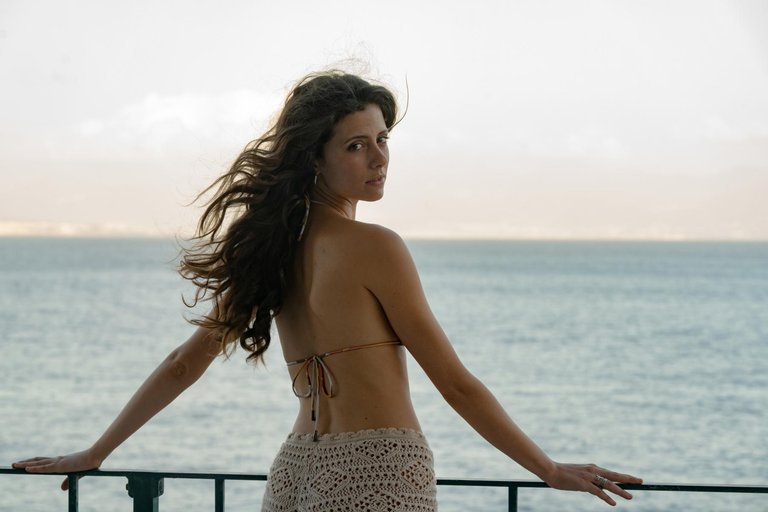
Celeste Dalla Porta is the Italian model and actress who embodies Parthenope, and in this role, her first feature film, she has achieved immortality. The film may not have the success or acclaim of Sorrentino's other stories, but the power and magnetism that Celeste imprints on the screen is responsible for the story's greatest virtues. You simply can't stop watching it and empathize with her, even if at times we don't understand why she does what she does. Parthenope is one of those women who captivates without effort, and once in your memory, she clings to it like Odysseus to the mast of his ship.
Celeste Dalla Porta es la modelo y actriz italiana que encarna a Parthenope y que en este papel, su primer largometraje, ha conseguido la inmortalidad. Puede que la película no tenga el éxito ni el reconocimiento de otras historias de Sorrentino, pero la fuerza y el magnetismo que imprime Celeste en la pantalla es la responsable de las mayores virtudes de la historia. Simplemente uno no puede dejar de verla y empatizar con ella aunque a veces no entendamos por qué hace lo que hace. Parthenope es de esas mujeres que cautivan sin esforzarse y que una vez en la memoria se aferran a ella como Odiseo al mástil de su navío.
Sorrentino is an artist, he has complete creative freedom over his work and it shows because he doesn't tell a story to be liked or think about what people will say. He allows himself to be satirical, funny, contradictory, enigmatic, even sacrilegious and - for some - misogynistic, but just like some of the characters in his film, the director understands that mystery is powerful. When we don't understand something, when we don't know it in depth, we feel a strong attraction to it. At the beginning we don't know Parthenope, but she attracts us like honey to flies; and throughout the film there are other things that are not clear and that doubt, that search for meaning, makes the story seduce us more than any explanation. The film itself recognizes in a dialogue the finality of something as the end of its mystery and its power (“Desire is a mystery and sex is its funeral”). Yes, the tape is a love letter to Naples, to its history, its inhabitants, its landscapes, its passion for calcium, but above all Parthenope is the emotional, funny and highly erotic story of a woman who embodies beauty and mystery, love and intelligence, recklessness and caution, seduction and surrender, and who is adrift in a social ocean where she doesn't know if her beauty is a condemnation, a liberation, a tool or a frivolity. And the mix of all these things make me want - now with more reason - to explore the filmography of Paolo Sorrentino (also responsible for the miniseries The New Pope), so, what is your favorite film of this Italian director? I read you in the comments.
Sorrentino es un artista, tiene completa libertad creadora sobre su obra y eso se nota porque no cuenta una historia para que guste ni piensa en qué dirá la gente. Se permite ser satírico, divertido, contradictorio, enigmático, incluso sacrílego y - para algunos - misógino, pero igual que algunos de los personajes de su cinta, el director entiende que el misterio es poderoso. Cuando no entendemos algo, cuando no lo conocemos a profundidad, sentimos una fuerte atracción hacia ello. Al inicio no conocemos a Parthenope, pero nos atrae como la miel a las moscas; y a lo largo de la película hay otras cosas que no quedan claras y esa duda, esa búsqueda de sentido, hace que la historia nos seduzca más que cualquier explicación. La propia cinta reconoce en un diálogo la finalidad de algo como el fin de su misterio y su poder ("El deseo es un misterio y el sexo es su funeral"). Sí, la cinta es una carta de amor a Nápoles, a su historia, sus habitantes, sus paisajes, su pasión por el calcio, pero sobre todo Parthenope es la historia emotiva, divertida y altamente erótica de una mujer que encarna la belleza y el misterio, el amor y la inteligencia, la temeridad y la precaución, la seducción y la entrega, y que va a la deriva en un océano social en donde no sabe si su belleza es una condena, una liberación, una herramienta o una frivolidad. Y la mezcla de todas estas cosas hacen que quiera - ahora con más razón - explorar la filmografía de Paolo Sorrentino (responsable también de la miniserie The New Pope), ¿cuál es su película favorita de este director italiano? Los leo en los comentarios.
__
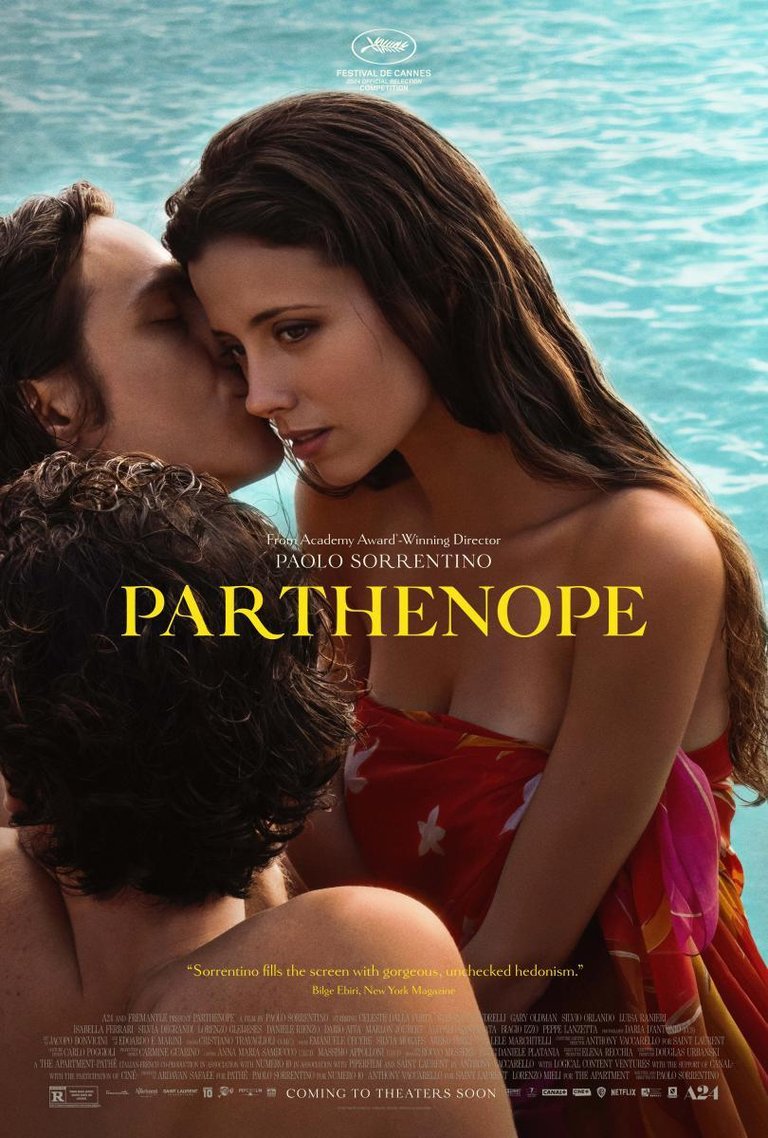
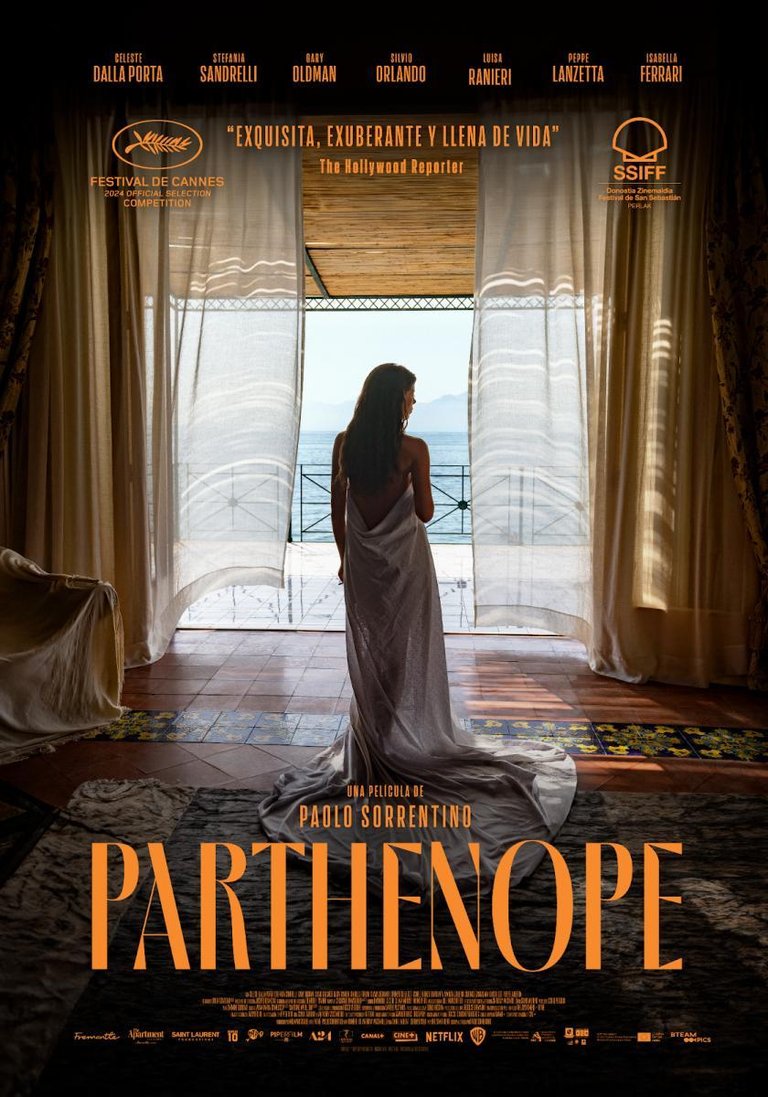
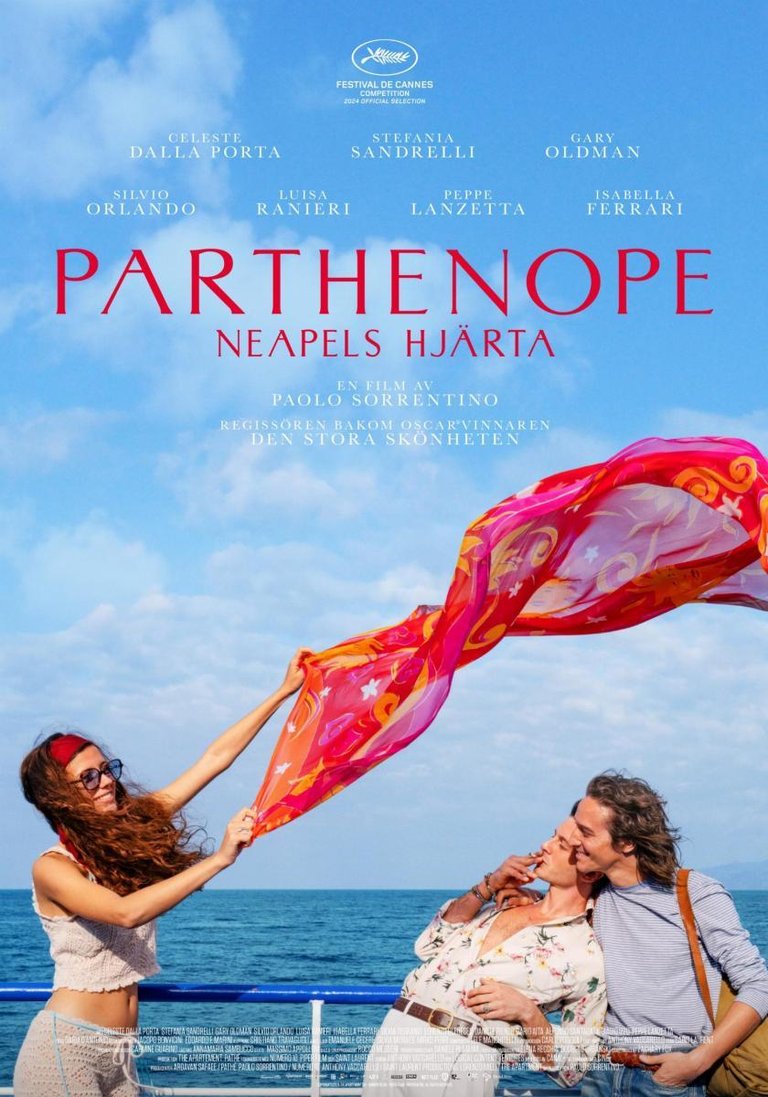
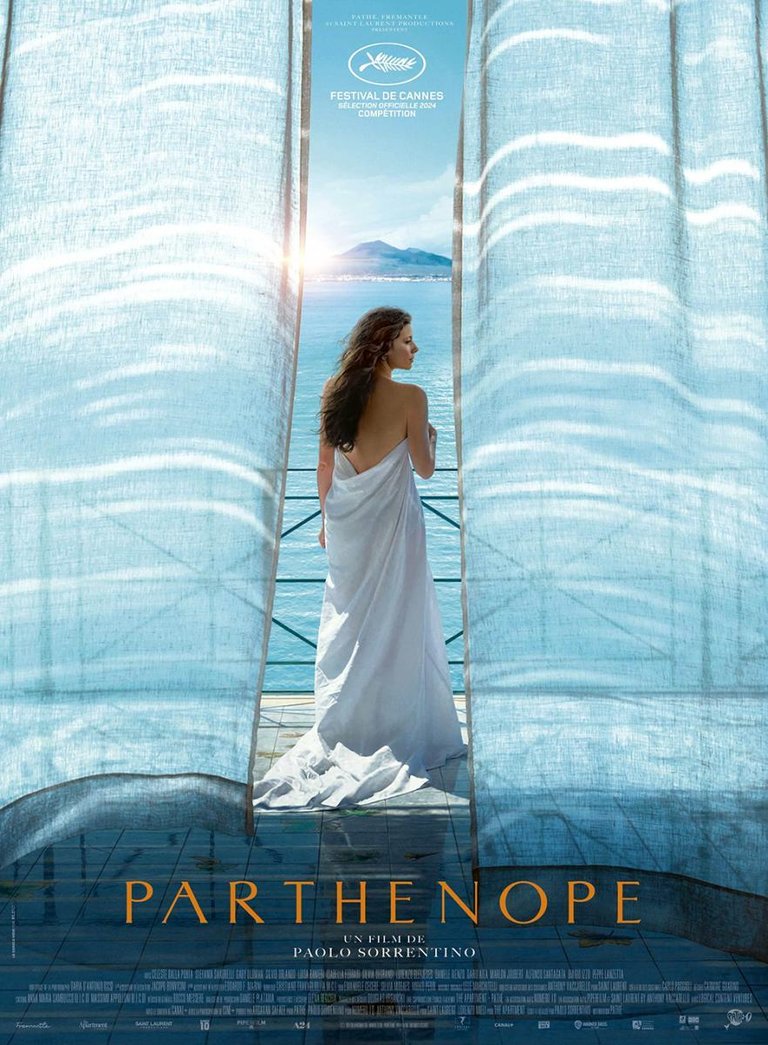
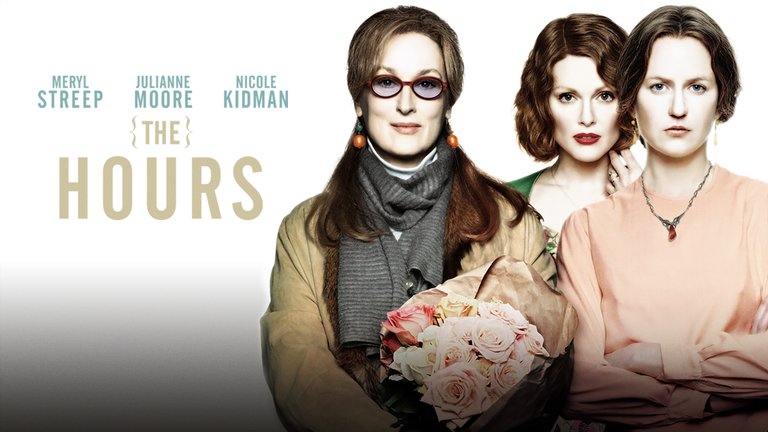
que interesante, gracias por la recomendación!
how interesting, thanks for the recommendation!